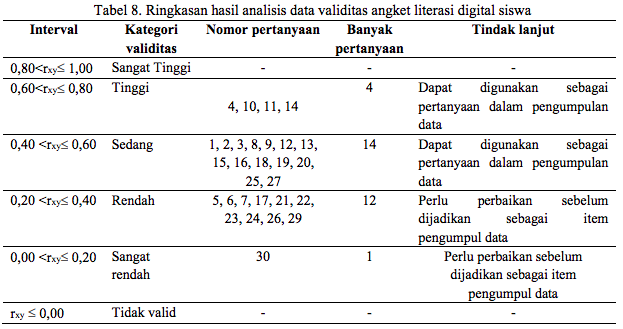
PENGEMBANGAN INSTRUMEN LITERASI DIGITAL SEKOLAH, SISWA DAN GURU
Abstract
This study aims to develop digital literacy instruments for schools, teachers and students whose function is to measure the extent of the digital literacy levels of schools, teachers, and students. It is not possible for a school to follow the development of science and technology if the school's potential is inadequate and its human resources are not ready. Therefore, the development of digital literacy instruments needs to be made in order to identify the level of readiness of schools, teachers and students in facing the digital era in the industrial revolution 4.0. Subjects of the study were 90 respondents consisting of 30 teachers and 60 students in SMA Negeri 14 Pekanbaru. The questionnaire that was made was first validated by 2 expert validators, after being declared valid by the expert validator, then the questionnaire was conducted a limited test to calculate the level of validity and reliability of each question item. The questionnaire uses a Likert scale with 3 categories of answer choices (often, rarely, never or there is, is being planned, no, etc.). Based on the results and conclusions, conclusions can be drawn, namely: the items that can be used as data collection tools on the school digital literacy questionnaire instrument are 23 questions, while the items that can be used as data collection tools on the teacher's digital literacy questionnaire are 52 items and instrument digital student literacy questionnaire as many as 31 questions. Based on the reliability criteria, the three digital literacy questionnaires show high and very high reliability criteria with a reliability level greater than 0.684.
Keywords
Full Text:
PDFReferences
A’yuni, Q. Q. (2015). Literasi digital remaja di kota surabaya. Libri-Net, 4(2), 1–15. Retrieved from
http://journal.unair.ac.id/literasi-digital-remaja-di-kota-surabaya-article-9195-media-136-
category-8.html
Akbar, M. F., & Anggaraeni, F. D. (2017). Technology in Education: Digital Literation and SelfDirected
Learning in Students Students. Jurnal Indigenous, 2(1), 28–38.
Aksoy, Z.D & Gökçe, P. (2016). Measuring Digital Literacy Skill: Development, Reliability, and
Validity of Open-ended Test. International Journal of Educational Research Review, 1(1).
Retrieved from
https://www.ijere.com/public/frontend/uploads/submissionrevfolder/335/measuring-digitalliteracy-skill-development-reliability-and-validity-of-open-ended-test-2hdeJ.docx
Cheng, P. G. F., Ramos, R. M., Bitsch, J. A., Jonas, S. M., Ix, T., See, P. L. Q., & Wehrle, K. (2016).
sychologist in a Pocket: Lexicon Development and Content Validation of a Mobile-Based App
for Depression Screening. JMIR MHealth and UHealth.
https://doi.org/https://doi.org/10.2196/mhealth.5284
Febliza, A., Afdal, Z. (2015). Statistika Dasar Penelitian Pendidikan. Pekanbaru: Adefa Grafika.
Hadi, S. (2000). Statistik. Yogyakarta: Andi Offset.
Herdhita Vidya, K. (2017). Literasi Digital di kalangan Guru SMA di Kota Surabaya. Journal
Universitas Airlangga, 6(4), 31–32.
Kurnia, N., Santi, D., & Astuti, I. (2017). Peta gerakan literasi digital di indonesia: studi tentang
pelaku, ragam kegiatan, kelompok sasaran dan mitra.
Nurjanah, E., Rusmana, A., & Yanto, A. (2017). Hubungan Literasi Digital Dengan Kualitas
Penggunaan E-Resources, 3(2), 117–140. Retrieved from
file:///C:/Users/USER~1.LAB/AppData/Local/Temp/16737-40838-1-SM.pdf
Pendidikan, K., & Jakarta, K. (2017). Materi pendukung literasi digital.
Plomp, T., dan Nieveen, N. (2010). An Introduction to Educational Design Research. Netherlands:
Netzodruk SLO.
Reja, U., Manfreda, K. L., & Hlebec, V. (2003). Open-ended vs . Close-ended Questions in Web
Questionnaires.
Shopova, T. (2014). Digital Literacy of Students and Its Improvement At the. ERIES Journal, 7(2), 2–
https://doi.org/10.7160/eriesj.2014.070201.Introduction
Sugiyono. (2016). Metode Penelitian Kuantitatif, Kualitatif dan R&D. Bandung: PT Alfabeta.
Wartomo. (2016). Prosiding temu ilmiah nasional guru (ting) viii. Prosiding Temu Ilmiah Nasional
Guru, 1–9(November), 632–641.
Wilson, J. R., & Ph, D. (2015). Rural High School Students ’ Digital Literacy, 16(2).
DOI: http://dx.doi.org/10.33578/jpk-unri.v5i1.7776
Refbacks
- There are currently no refbacks.

This work is licensed under a Creative Commons Attribution-ShareAlike 4.0 International License.

1.jpg)





